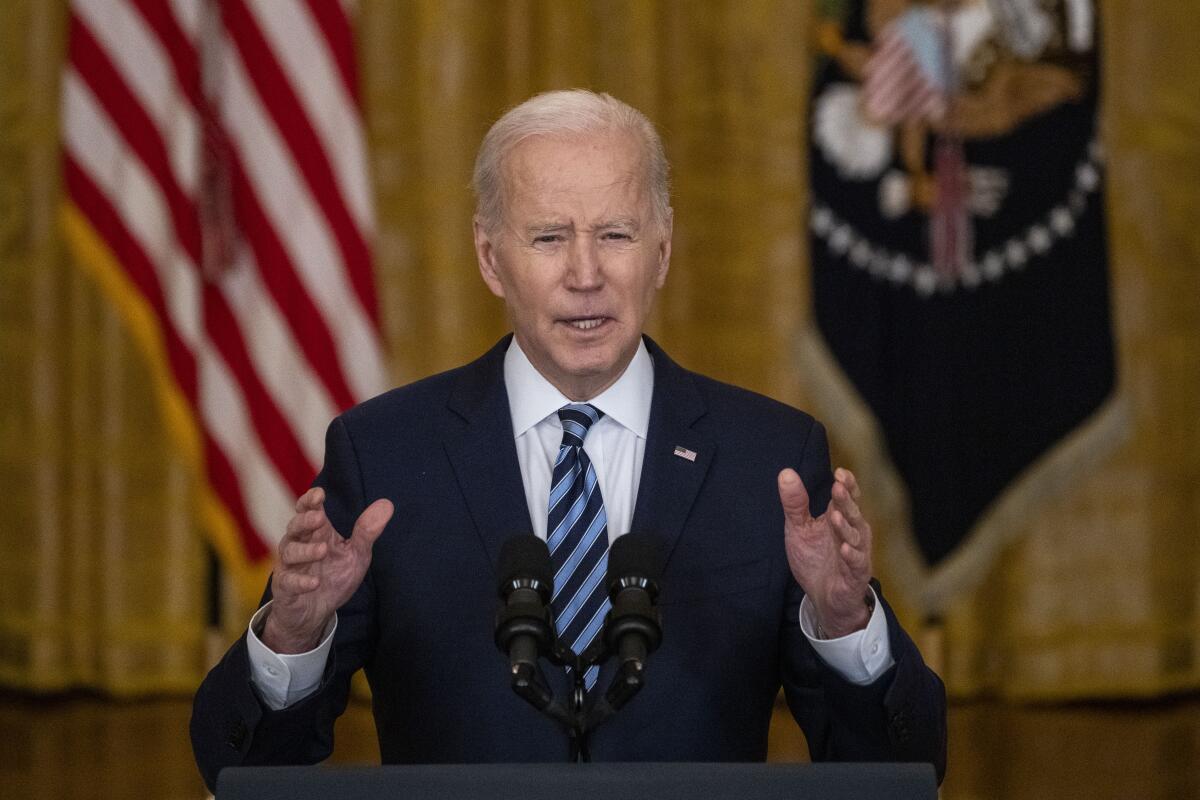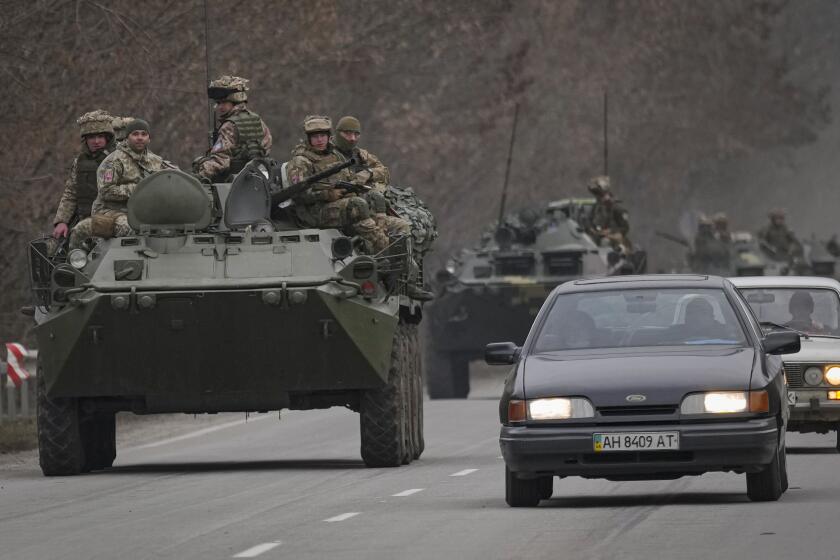Biden stiffens sanctions on Russia over Ukraine invasion

- Share via
WASHINGTON — President Biden announced Thursday that the U.S. would impose severe economic sanctions on Russia, responding swiftly with European allies to what he called an “unprovoked and unjustified attack” on Ukraine, while steering clear of measures that might roil global energy markets.
Russian President Vladimir Putin “is the aggressor,” Biden declared. “Putin chose this war. And now he and his country will bear the consequences.”
Speaking from the East Room of the White House, the president announced that the U.S. and its European allies would sanction five Russian banks holding about $1 trillion in assets and block high-tech exports to the country.
“Every asset they have in America will be frozen,” Biden pledged, adding that the U.S. would also be sanctioning Russian “elites and their family members.” Though Putin himself was not personally targeted by sanctions, Biden said such an action was still “on the table.”
A senior Biden administration official who briefed reporters said the oligarchs sanctioned are members of Putin’s inner circle. “The goal was to get at the elites closest to Putin and the Kremlin,” the official said. “We know that by starving these individuals, we are starving Putin.”
The announcement came hours after Russia launched an all-out assault on Ukraine, with troops and tanks advancing across the border and missiles and artillery fire hitting strategic installations. Putin ordered the attack despite weeks of diplomacy by the U.S. and its allies aimed at averting a war that Biden said was brought “without provocation, without justification, without necessity.”
The administration has imposed an escalating series of sanctions on Moscow in recent days. Ukrainian officials and some U.S. lawmakers were hoping Biden would strike an even tougher blow to Russia’s economy on Thursday. But Biden opted to not sanction Russian energy giant Rosneft and instead focused this round of economic penalties on financial institutions, largely to avoid disrupting global energy markets, a concern the president articulated.
“As we respond, my administration is using the tools, every tool, to protect American families and businesses from rising prices at the gas pump,” he said.
A full-scale Russian invasion of Ukraine appears imminent, but the two countries have for years been locked in cyber combat.
Biden also confirmed his administration would not seek to bar Russia from using SWIFT, the global financial messaging network that connects more than 11,000 banks. Ukrainian officials, including the country’s president, had been vocal in urging Biden to block Russia from SWIFT, an action analysts say would have devastating consequences for Russia’s economy.
The White House avoided that step because it could lead to a rise in global energy prices, according to an administration official who spoke on condition of anonymity to discuss sensitive internal deliberations.
Biden acknowledged that persuading European countries to embrace such a move was another stumbling block.
“It is always an option, but right now that’s not the position that the rest of Europe wishes to take,” Biden said in response to a reporter’s question after delivering his remarks. The president asserted that the sanctions the administration was imposing would be just as consequential as blocking Russia from SWIFT.
Experts said it appeared the Biden administration was taking a hard line on Moscow while keeping its most serious economic weapons in reserve.
“There’s a conscious decision to pull a few punches,” said Jeffrey Schott, senior fellow at the Peterson Institute for International Economics, a think tank based in Washington.
Schott said the sanctions on financial institutions and high-tech exports to Russia will have a corrosive effect on the nation’s economy, damaging its productivity and growth while degrading its military capabilities over time. The U.S. could have dealt a more immediate blow if it had sought to block the sale of Russian oil and gas to Europe; instead, he said, Russian companies and its government will continue to make “windfall profits” because the invasion has driven prices higher.
Bruce Jentleson, who was an Obama State Department senior advisor, noted that countries such as Russia that have been routinely sanctioned have found ways around such measures. “Putin, for example, has accumulated $640 billion in hard currency reserves,” he said. “That buys him a certain amount of insulation.”
Russian tanks and troops crossed into Ukraine on Thursday after a night of shelling. But why is Russia attacking Ukraine? What is Putin’s goal?
In Washington, lawmakers from both parties expressed dismay that the sanctions weren’t stronger.
Rep. Adam B. Schiff (D-Burbank), chairman of the House Intelligence Committee, had pushed for banning Russia from SWIFT.
Senate Minority Leader Mitch McConnell (R-Ky.), who had previously given the White House high marks for its approach to Putin, criticized Biden harshly for not imposing sanctions sooner. “Deterrence after the fact is not deterrence at all,” he said in a statement.
Biden used his speech to argue that the U.S. alliance with Western European nations is “more united than it’s ever been,” and promised the U.S. response would “limit Russia’s ability to do business in dollars, euros, pounds and yen.”
Though the president reiterated that U.S. troops would not be deployed to fight in Ukraine, he reaffirmed America’s commitment to Article V of the North Atlantic Treaty, an implicit warning to Putin that any invasion of NATO member countries outside Ukraine would be met with military force.
“This is a complete rupture now in U.S.-Russia relations,” Biden said during a back-and-forth with reporters shouting questions after his remarks.
After the president’s speech, the Pentagon announced the deployment of 7,000 additional U.S. service members to Europe, an effort to shore up defenses on the North Atlantic Treaty Organization’s eastern flank, along Russia’s western border.
A senior Pentagon official said Thursday that Russia’s assault on Ukraine, the first major conflict on European soil in decades, was only just beginning.
“What we’re seeing are initial phases of a large-scale invasion,” the official said, speaking on condition of anonymity.
The official said Russia appeared to be advancing in a three-pronged land assault on Ukraine from the east and from two regions in Belarus, on Ukraine’s northern border, with a clear goal: to “decapitate” the pro-Western Ukrainian government led by President Volodymyr Zelensky and replace it with leaders friendly to the Kremlin.
The White House had already ordered sanctions this week that officials said would target Russian financial institutions and a few of the country’s elites and their family members, including the head of Russia’s Federal Security Service, the main domestic security agency that is the successor to the Soviet-era KGB. The administration held back its stiffest measures and said it would escalate if and when Putin’s invasion ramped up.
On Wednesday, Biden said he would allow previously blocked sanctions to take effect against the company behind the Nord Stream 2 gas pipeline, built to transport natural gas from Russia directly to Germany. The U.S. “will not hesitate to take further steps if Russia continues to escalate,” he said in a statement.
That announcement came a day after German Chancellor Olaf Scholz said he had taken steps to halt the process of certifying the pipeline, which has yet to begin operating.
The sanctions are being imposed as the Kremlin has pressed ahead with its assault on Ukraine, with explosions heard in cities across the country as Russian troops crossed the border by land and sea, despite Moscow’s denials that an invasion was planned.
Video showed Russian armored vehicles advancing into mainland Ukraine from Crimea, the peninsula that Moscow illegally seized eight years ago. Ukrainian air traffic controllers sealed off the country’s airspace “due to the high risk ... for civil aviation.”
In response to the attacks, Zelensky declared martial law in his beleaguered nation and encouraged his compatriots to take up arms.
Times staff writers Sam Dean in Los Angeles and Jennifer Haberkorn, Anumita Kaur, Tracy Wilkinson and Sarah D. Wire in Washington contributed to this report.
More to Read
Get the L.A. Times Politics newsletter
Deeply reported insights into legislation, politics and policy from Sacramento, Washington and beyond. In your inbox twice per week.
You may occasionally receive promotional content from the Los Angeles Times.













